-
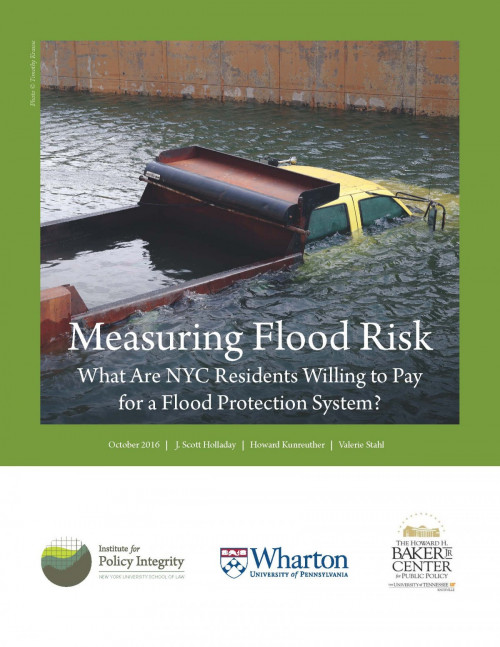
Measuring Flood Risk
What Are NYC Residents Willing to Pay for a Flood Protection System?
This policy brief evaluates how willingness to pay (WTP) for a flood protection system varies with exposure to flood risk, using detailed flood maps and parcel-level data to identify households within and just beyond the 100-year flood plain in New York City. Past research has estimated that a homeowner’s WTP for flood insurance is largely contingent upon their risk level. However, no studies to date have analyzed the WTP for other forms of flood protection. We conducted a survey of single-family homeowners living in the 100- and 500-year flood plains in New York City, and found that WTP for flood control systems varies with the degree of risk that homeowners face. While the majority of residents living in the 100- year flood plain were willing to pay up to $10 a month to contribute to the cost of a seawall, the majority of residents living in the 500-year flood plain, an area that has a 0.2% risk of flooding in any given year, were only willing to pay up to $7 a month. These results are consistent with other studies demonstrating that risk—actual or perceived—plays a large role in individuals’ WTP for protection from floods.
-
Comments on New York State Clean Energy Standard Petitions
We recently submitted comments to the New York State Public Service Commission, responding to petitions for rehearing on the Clean Energy Standard. The Commission’s Clean Energy Standard created Zero-Emissions Credits for nuclear generation, compensating these zero-emissions generators through a valuation system based on the Social Cost of Carbon (“SCC”). Various parties submitted petitions for rehearing or clarification, and criticized the Order on a variety of grounds. Among other criticisms, challengers argue that it was inappropriate for the Commission to use the SCC to value the zero‐emission attributes of nuclear energy resources alone, and that other types of low‐ emitting resources (e.g., small hydro) should receive commensurate payments for their zero‐emission characteristics.
-
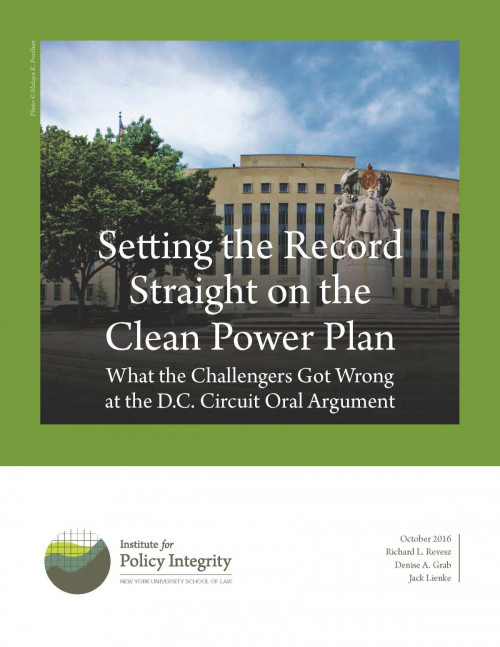
Setting the Record Straight on the Clean Power Plan
What the Challengers Got Wrong at the D.C. Circuit Oral Argument
On September 27, opponents of the U.S. Environmental Protection Agency’s Clean Power Plan presented their case against the rule in a hearing before the U.S. Court of Appeals for the D.C. Circuit. The Clean Power Plan aims to reduce carbon dioxide emissions from the nation’s existing power plants. A coalition of states, utilities, coal companies, and other industry groups have sought to block the rule since it was first proposed in June 2014, while a competing group of states, municipalities, power companies, environmental and public health organizations, and clean energy producers have intervened to support the EPA. Over the course of the seven-hour hearing, the petitioners challenging the Clean Power Plan asserted and implied a number of things that don’t stand up to scrutiny. This report sets the record straight on some of their more notable misstatements.
-
Détente from the Air
Monitoring Air Pollution during the Cold War
During the period of détente in the 1970s, a Norwegian proposal to construct an air pollution monitoring network for the European continent resulted in the first concrete collaboration between the communist and capitalist blocs after the 1975 Helsinki Accords. Known as the “European-wide monitoring programme” or EMEP, the network earned considerable praise from diplomats for facilitating cooperation across the Iron Curtain. Yet as this article argues, EMEP was strongly influenced by the politics of détente and the constraints of the Cold War even as it helped to decrease tensions. Concerns about national security and sharing data with the enemy shaped both the construction of the monitoring network and the modeling of pollution transport. The article proposes that environmental monitoring systems like EMEP reveal the ways in which observational technologies can affect conceptions of the natural world and the role of science in public policy.
-
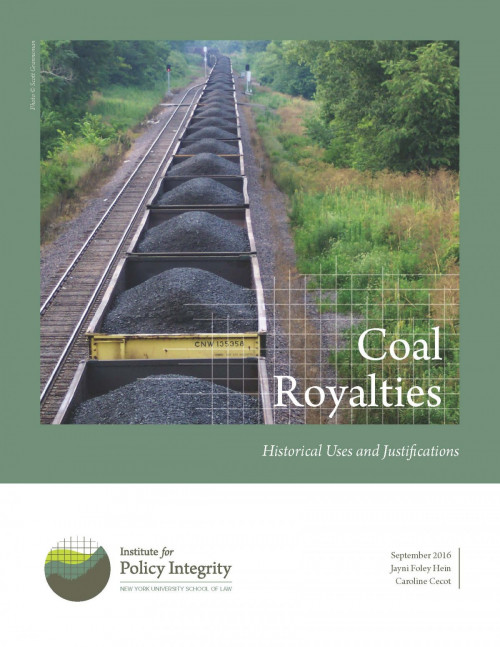
Coal Royalties
Historical Uses and Justifications
Royalties have been used as a policy lever to influence behavior and meet national goals for centuries. For example, royalties have been set at specific rates in order to: encourage resource production; encourage westward expansion; maintain the incentive to create new inventions; and deter socially undesirable behavior, to name just a few. This report concludes that it would be reasonable for Interior to adjust coal royalty rates to account for negative externalities that are not otherwise addressed by regulation. Historical uses, accepted economic justifications, legislative history, and examples of royalty use by private actors and in other industries discussed in the paper all support the determination that it would be reasonable for Interior to increase coal royalty rates to account for externality costs and to better align the federal coal program with national climate change priorities.
-
Comments on New York State Benefit Cost Analysis Handbooks
We recently submitted reply comments to the New York State Public Service Commission on Benefit Cost Analysis Handbooks submitted to the Commission by utility companies, within the Reforming the Energy Vision proceeding. Benefit-cost analysis will assist in determining the best resource allocations between traditional utility distribution grid investments and distributed energy resources (DER), by allowing for direct comparison. These Handbooks will help ensure that the utilities’ benefit-cost analyses will help to select investment options that will maximize net benefits to the public.
-
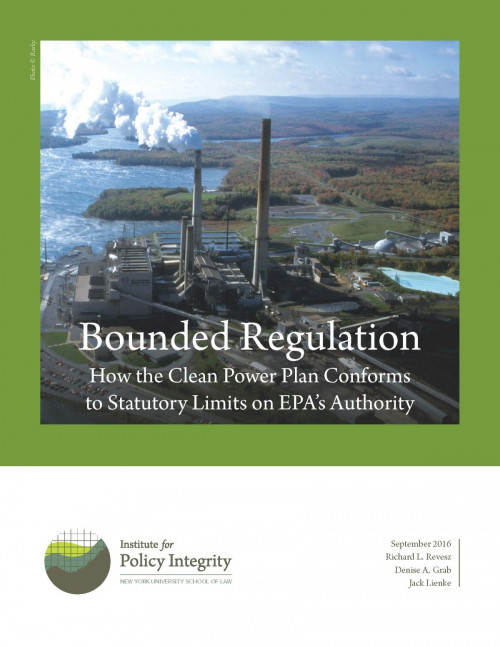
Bounded Regulation
How the Clean Power Plan Conforms to Statutory Limits on EPA’s Authority
This policy brief analyzes the limits of the EPA’s Section 111 regulatory authority and determines that the CPP explicitly acknowledges and respects each of the EPA’s statutory constraints. The brief discusses the eight major constraints for emissions guidelines under Clean Air Act Section 111, and examines how the CPP handles each one. The analysis finds no evidence to support petitioners’ accusations that the the EPA exceeded its regulatory authority.
-
Comments on NARUC’s Distributed Energy Resources Compensation Manual
As distributed energy resources (DER) become more common and play a larger role in helping meet clean energy targets, many states are increasing their focus on the valuation and compensation of these resources. The National Association of Regulatory Utility Commissioners (NARUC) is creating a manual to assist states with these key policy questions. We recently submitted comments to NARUC’s Staff Subcommittee on Rate Design to help ensure that the manual is complete, accurate, and unbiased.
-
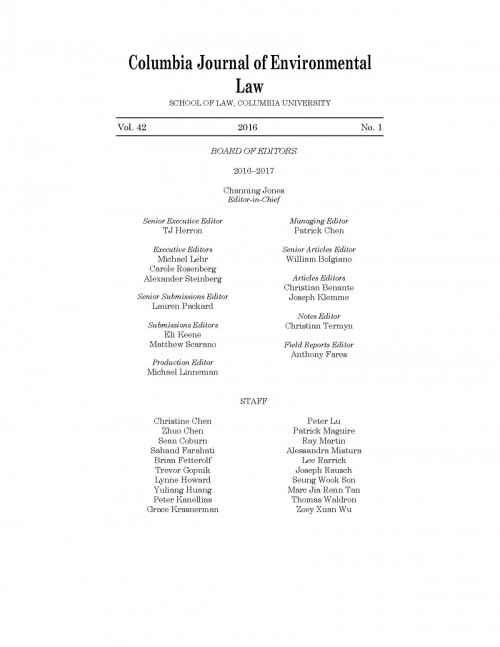
Think Global
International Reciprocity as Justification for a Global Social Cost of Carbon
U.S. climate regulations present a special case of federal agencies applying a global, rather than exclusively domestic, perspective to the costs and benefits in their regulatory impact analyses. Since 2010, federal agencies have emphasized global valuations of climate damages for policies that affect carbon dioxide emissions, using a metric called the “Social Cost of Carbon.” More recently, agencies have also begun to use a global valuation of the “Social Cost of Methane,” for methane emissions. Yet lately, these global metrics have come under attack in courtrooms and academic journals, where opponents have challenged the statutory authority and economic justification for global values. This paper defends a continued focus on the global effects of U.S. climate policy, drawing on legal, strategic, and economic arguments.
-
Federal Court Supports Use of Social Cost of Carbon
On August 8, 2016, the Seventh Circuit handed down its opinion in Zero Zone, Inc. v. United States Department of Energy, upholding the agency’s use of the social cost of carbon (SCC) in its regulatory impact analysis of commercial refrigerator energy efficiency standards. The ruling may have paved the way for a new chapter in economically efficient U.S. climate policies, and our brief for the case was acknowledged in the judges’ opinion.

